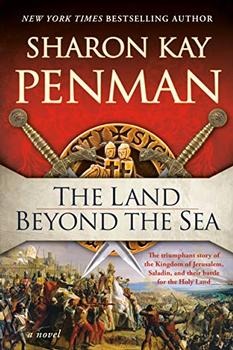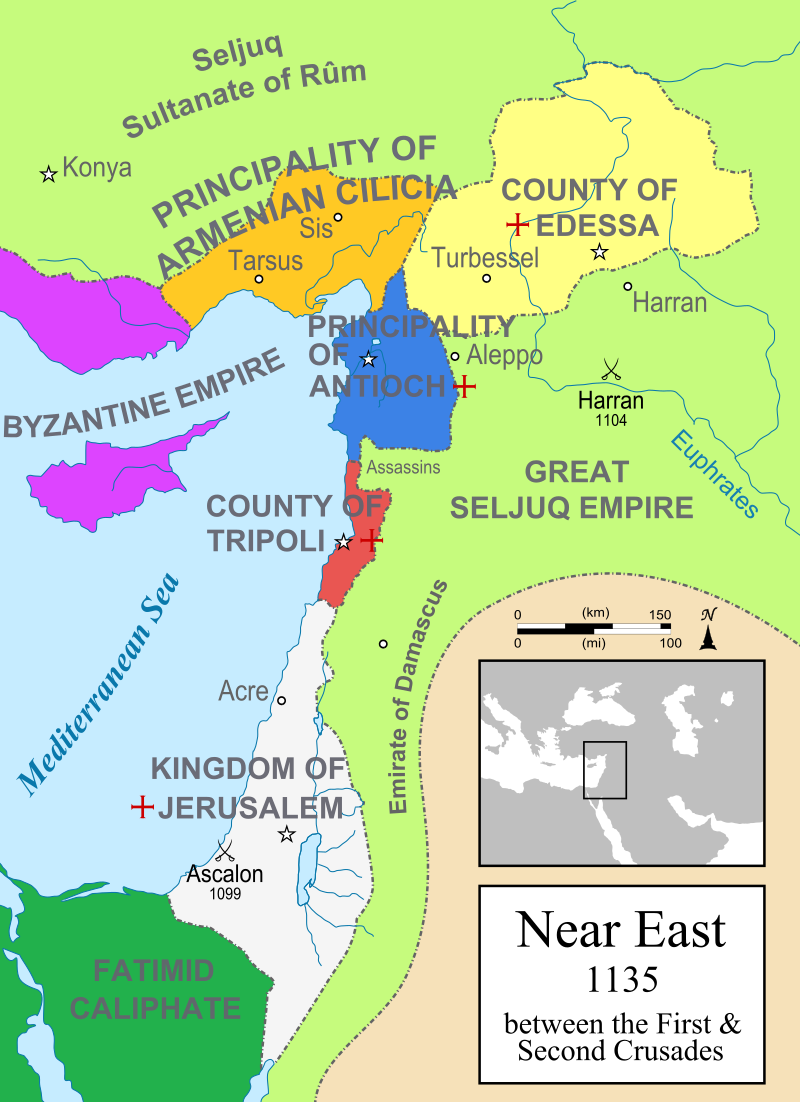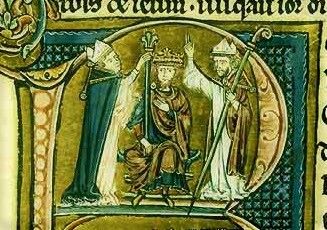Summary | Excerpt | Reviews | Beyond the Book | Read-Alikes | Genres & Themes | Author Bio

Critics' Opinion:
Readers' Opinion:
First Published:
Mar 2020, 688 pages
Paperback:
Mar 2021, 688 pages
 Book Reviewed by:
Book Reviewed by:
Kim Kovacs
Buy This Book
This article relates to The Land Beyond the Sea
 Sharon Kay Penman's novel The Land Beyond the Sea is set in the Middle Ages in a region known as Outremer (pronounced OO-tray-mare). This collection of European-held city-states was formed during the First Crusade and comprised of the Kingdom of Jerusalem, the County of Edessa, the County of Tripoli and the Principality of Antioch.
Sharon Kay Penman's novel The Land Beyond the Sea is set in the Middle Ages in a region known as Outremer (pronounced OO-tray-mare). This collection of European-held city-states was formed during the First Crusade and comprised of the Kingdom of Jerusalem, the County of Edessa, the County of Tripoli and the Principality of Antioch.
Jerusalem is revered by the three major Abrahamic religions (Judaism, Christianity and Islam) as a holy city, and has been important to all three for millennia. Historically, various groups have fought for control of it and the surrounding territory. From the 7th century to the end of the 11th century CE, the area was under Muslim rule. The series of wars referred to as the Crusades were set in motion when the Seljuk Turks (Sunni Muslims with their empire centered in Baghdad) captured Jerusalem in 1087 CE from the Fatimid Empire (Shia Muslims with their empire centered in Cairo). In Constantinople (modern day Istanbul), Christian Emperor Alexios I Komneos became concerned by the Seljuks' increasing proximity to his own empire of Byzantium, and appealed to Pope Urban II for military help. In November 1095, the Pope held a meeting in France known as the Council of Clermont, during which he appealed to those assembled to stop fighting amongst themselves and turn their attention instead to the "infidels"—the Muslims. His call to arms was framed as a liberation of the Holy Land from "unclean" hands, and the liberators were promised a full remission of their sins for their participation. Thus, the First Crusade was born, and led to war between the Christian East and the Islamic West that would last for over 200 years (and, some would say, birthed hostilities that continue to this day).
The Crusaders reached Jerusalem on June 7, 1099 after a long and bloody march. The ruling Fatimids (who had retaken the city from the Seljuks the previous year) knew the warriors were coming and were well-prepared for an extended siege; in addition to stockpiling food and other supplies, they had expelled the Christians within the city to prevent sabotage from potential sympathizers. The Crusaders surrounded Jerusalem for several weeks, suffering far more than those inside the city walls; food and water were in short supply, and men and animals began to die from thirst and starvation. A June 13 attack ended in failure, but they were finally able to breach the walls on July 14, and proceeded to indiscriminately slaughter the inhabitants in one of the most brutal acts recorded during the holy wars.
 Over the ensuing weeks a government was established for the newly-formed Kingdom of Jerusalem, with Godfrey of Bouillon made ruler due to his leadership during the siege. He died just a year later, at which point Baldwin I, Godfrey's younger brother and the first Count of Edessa, became King of Jerusalem. The other (Christian) regional leaders swore fealty to him, uniting the region that Europe called "Outremer," or "beyond the sea."
Over the ensuing weeks a government was established for the newly-formed Kingdom of Jerusalem, with Godfrey of Bouillon made ruler due to his leadership during the siege. He died just a year later, at which point Baldwin I, Godfrey's younger brother and the first Count of Edessa, became King of Jerusalem. The other (Christian) regional leaders swore fealty to him, uniting the region that Europe called "Outremer," or "beyond the sea."
With Jerusalem safely secured, the soldiers of the First Crusade proclaimed their mission accomplished and most headed home. Later pilgrims to the Holy Land, who were frequently soldiers, often stayed for a time to augment defenses, but generally the cities of Outremer were chronically undermanned. The Muslims, disorganized and reeling from their defeats, were still unable to put up much of a counter-attack—at first. This changed when Imad al-Din Zangi, an Iraqi ruler, laid siege to Edessa, which was captured in 1144. The Second Crusade was launched, but the soldiers came too late; Zangi's successor, Nur al-Din, completely sacked Edessa in 1146, and the participants of the Second Crusade returned home in failure in 1148. Nur al-Din proceeded to retake Antioch in 1149.
The situation became increasingly dire for the Christians attempting to hold Outremer together. The kingdom suffered from, among other issues, constant wrangling over successions and the early deaths of nobility due to illness and constant battle, which left inexperienced leadership in control of crucial military decisions. The breaking point came when the Sultan of Egypt and Syria, Saladin, decimated the Kingdom of Jerusalem's army at the Battle of Hattin in July 1187. The city was surrendered to the Muslims in September of that year, and the Christian population was expelled. The Third Crusade (in which Richard the Lionheart of England famously participated) was subsequently launched; it was able to re-establish a capital in the port city of Acre but failed to recapture Jerusalem. Hostilities continued until the end of the Ninth Crusade (1271-1272), when Acre fell, thereby dissolving the last remnant of Outremer.
The Near East in 1135 CE by MapMaster via Wikimedia Commons (CC BY-SA 3.0)
Illustration of the crowning of Baldwin I of Jerusalem from Histoire d'Outremer by William of Tyre
Filed under People, Eras & Events
![]() This "beyond the book article" relates to The Land Beyond the Sea. It originally ran in May 2020 and has been updated for the
March 2021 paperback edition.
Go to magazine.
This "beyond the book article" relates to The Land Beyond the Sea. It originally ran in May 2020 and has been updated for the
March 2021 paperback edition.
Go to magazine.





The House on Biscayne Bay
by Chanel Cleeton
As death stalks a gothic mansion in Miami, the lives of two women intertwine as the past and present collide.

The Flower Sisters
by Michelle Collins Anderson
From the new Fannie Flagg of the Ozarks, a richly-woven story of family, forgiveness, and reinvention.

The Funeral Cryer by Wenyan Lu
Debut novelist Wenyan Lu brings us this witty yet profound story about one woman's midlife reawakening in contemporary rural China.
Your guide toexceptional books
BookBrowse seeks out and recommends the best in contemporary fiction and nonfiction—books that not only engage and entertain but also deepen our understanding of ourselves and the world around us.